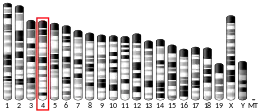CEP104
Centrosomal protein 104kDa is a protein that in humans is encoded by the CEP104 gene. [5] Like its Chlamydomonas ortholog, FAP256, it has been shown to localize to the distal ends of both centrioles in the absence of a cilium. During cilium formation, it is found at the tip of the elongating cilium.[6]
| CEP104 | |||||||||||||||||||||||||||||||||||||||||||||||||||
|---|---|---|---|---|---|---|---|---|---|---|---|---|---|---|---|---|---|---|---|---|---|---|---|---|---|---|---|---|---|---|---|---|---|---|---|---|---|---|---|---|---|---|---|---|---|---|---|---|---|---|---|
| Identifiers | |||||||||||||||||||||||||||||||||||||||||||||||||||
| Aliases | CEP104, GlyBP, KIAA0562, CFAP256, JBTS25, ROC22, centrosomal protein 104 | ||||||||||||||||||||||||||||||||||||||||||||||||||
| External IDs | OMIM: 616690 MGI: 2687282 HomoloGene: 44919 GeneCards: CEP104 | ||||||||||||||||||||||||||||||||||||||||||||||||||
| |||||||||||||||||||||||||||||||||||||||||||||||||||
| |||||||||||||||||||||||||||||||||||||||||||||||||||
| |||||||||||||||||||||||||||||||||||||||||||||||||||
| |||||||||||||||||||||||||||||||||||||||||||||||||||
| Wikidata | |||||||||||||||||||||||||||||||||||||||||||||||||||
| |||||||||||||||||||||||||||||||||||||||||||||||||||
References
- GRCh38: Ensembl release 89: ENSG00000116198 - Ensembl, May 2017
- GRCm38: Ensembl release 89: ENSMUSG00000039523 - Ensembl, May 2017
- "Human PubMed Reference:". National Center for Biotechnology Information, U.S. National Library of Medicine.
- "Mouse PubMed Reference:". National Center for Biotechnology Information, U.S. National Library of Medicine.
- "Entrez Gene: Centrosomal protein 104kDa". Retrieved 2014-06-04.
- Satish Tammana TV, Tammana D, Diener DR, Rosenbaum J (November 2013). "Centrosomal protein CEP104 (Chlamydomonas FAP256) moves to the ciliary tip during ciliary assembly". Journal of Cell Science. 126 (Pt 21): 5018–29. doi:10.1242/jcs.133439. PMC 3820246. PMID 23970417.
External links
Further reading
- Kumar KN, Babcock KK, Johnson PS, Chen X, Ahmad M, Michaelis EK (November 1995). "Cloning of the cDNA for a brain glycine-, glutamate- and thienylcyclohexylpiperidine-binding protein". Biochemical and Biophysical Research Communications. 216 (1): 390–8. doi:10.1006/bbrc.1995.2636. PMID 7488117.
- Jakobsen L, Vanselow K, Skogs M, Toyoda Y, Lundberg E, Poser I, Falkenby LG, Bennetzen M, Westendorf J, Nigg EA, Uhlen M, Hyman AA, Andersen JS (April 2011). "Novel asymmetrically localizing components of human centrosomes identified by complementary proteomics methods". The EMBO Journal. 30 (8): 1520–35. doi:10.1038/emboj.2011.63. PMC 3102290. PMID 21399614.
This article is issued from Wikipedia. The text is licensed under Creative Commons - Attribution - Sharealike. Additional terms may apply for the media files.



